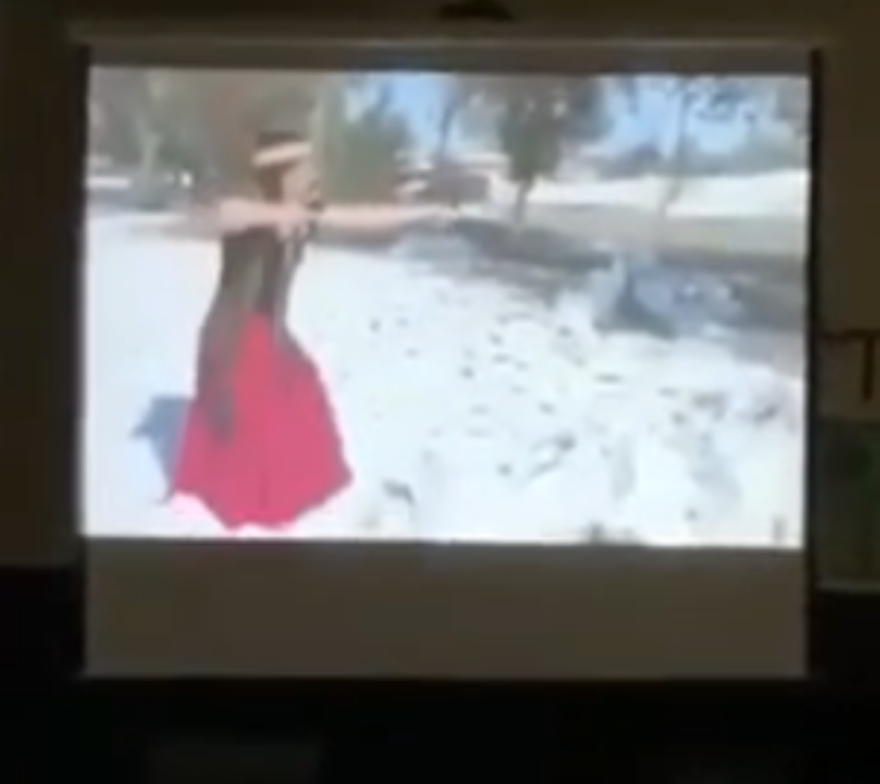Valier Superintendent Responds To Controversial Pep-Rally Video
After a video that some say depicts Native Americans in a reductive light was shown at a pep rally at a northern Montana high school a few weeks ago, two school districts are grappling with which matters more: intent or interpretation?
Valier High School Superintent Julie Gaffney describes outrage over a student-made video unfair, unwarranted and inaccurate. “You can’t control how people take things,” Gaffney says.
Three weeks ago, Valier freshmen put together a video ahead of their homecoming game against Heart Butte High School. One scene showed a fair-skinned girl in a feathered headband, braids and a red skirt falling into a bank of snow after getting shot.
The video was posted on Facebook the day after the pep rally. The backlash was immediate. Commentors called the video, “very rude, disrespectful.” Others said it was “blown out of proportion.”
In a press release, Valier Superintendent Gaffney said the school would look into the video.
This is the first time Yellowstone Public Radio has spoken to her since her investigation concluded last week.
She says she didn’t know red dresses have become an international symbol for missing and murdered indigenous women and neither did her freshman students when they made the video for their game against Heart Butte. Heart Butte is on the Blackfeet Reservation and is all- Native except for two students. Compare that to Valier, which is just outside the reservation and majority-white.
Gaffney says it’s a Valier tradition for each class to make themed videos for homecoming. For this year’s freshman, the theme was the Fourth of July. She says their concept was to portray a Revolutionary War tussle between the British and colonists, with the British being Heart Butte and the Colonists being Valier. She says a Valier student wore traditional Native garb to symbolize the other team, the Heart Butte Warriors.
“The video was not made to humiliate the MMIW or embarrass. It wasn’t that,” Gaffney says.
She says she can’t control that people took it that way. The way she sees it, it’s not her job or in her control to change how people feel.
Olivia Reingold: I think Heart Butte thinks you do. I think they want an apology for the accidental offense. I think that that is something that is within your control. Is that something you would be interested or doing or saying?
Julie Gaffney: I think I expressed myself very clearly how I felt in the article that I wrote.
OR: OK, and just to confirm, there’s no apology in here.
JG: You can’t put in the paper that I said, ‘No, we’re not coming forth with an apology.' That just to me is not…
OR: Please help me understand.
JG: What I believe is, I let the stakeholders understand. And so, to me, the only people that I really need to be answering to would be the students at Heart Butte and the best vehicle for that, I feel, is to give our students an opportunity to at some point process this.
Heart Butte Superintendent Mike Tatsey says he sent an invitation to Valier for the student bodies to get together for a talking circle but didn’t hear back. He says he’s not in control of their response, adding if they don’t want to get together, he can’t force them.
“In our culture, when we want to help somebody, we pray for them. As Native Americans that’s all we can do to help people understand our situation,” Tastey says.
He’s talking about is missing and murdered indigenous people. Ashley Loring Heavy Runner, a Blackfeet tribal member, has been missing for more than a year. Tatsey says she went to Heart Butte. That’s the sort of thing he says the Valier administration “could do a better job of understanding what’s in the community, and what’s nearby."
He says Valier is less than ten miles from the Blackfeet Nation and that there are billboards about missing and murdered indigenous people nearby in Conrad.
But Tatsey says it’s ok the school made a mistake in this instance. He says he knows they didn’t do it on purpose and he doesn’t expect the school to admit that. All he wants is an apology.
“A simple, 'We’re sorry, we didn’t know that. Even though that wasn’t our intent, that was the impression people got,'” Tatsey says.
But since he’s not sure that’s coming, he says he’ll keep praying for people who don’t understand Native culture and history.
Olivia Reingold is Yellowstone Public Radio’s Report for America corps member.
Copyright 2019 Yellowstone Public Radio


